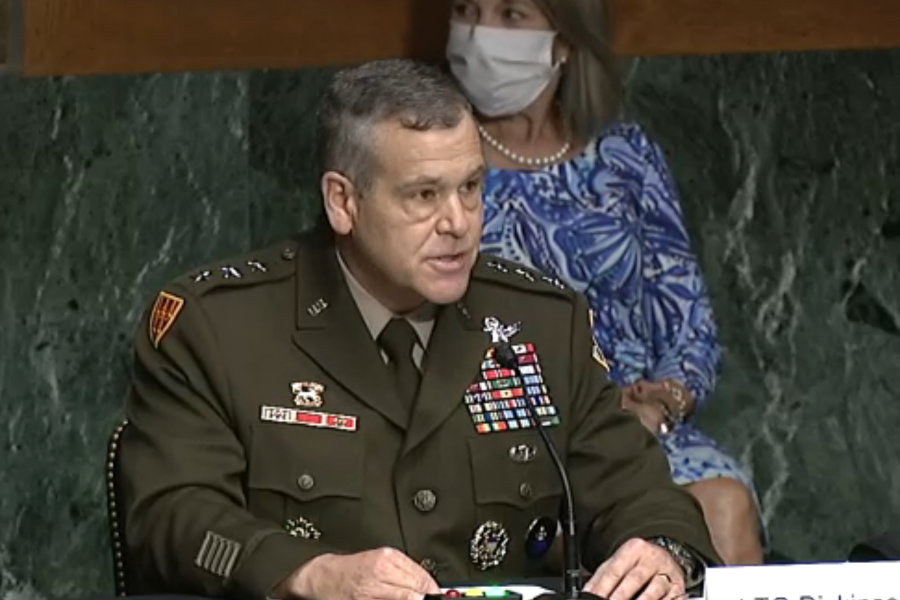Army Lt. Gen. James H. Dickinson on July 28 outlined his plans to continue ingraining space operations expertise around the U.S. military if confirmed as the next boss of U.S. Space Command.
Dickinson, currently SPACECOM’s deputy commander, would be the first uniformed officer outside the Department of the Air Force to run the organization. SPACECOM oversees daily operations of military space assets such as the GPS satellites and radars that warn of incoming ballistic missiles, which until recently have been Air Force missions.
If confirmed, Dickinson would replace Gen. John W. Raymond, who also serves as the Space Force’s first chief of space operations. Raymond has run SPACECOM since last summer, when it was revived after being absorbed by U.S. Strategic Command in 2002.
Raymond and his enlisted counterpart, Senior Enlisted Leader Chief Master Sgt. Roger A. Towberman, led SPACECOM in its first year as a bridge between its traditional Air Force leadership and a more joint approach. While unorthodox, tapping an Army general to oversee SPACECOM is an acknowledgement that the entire military benefits from, and is responsible for defending, space. Marine Corps Master Gunnery Sgt. Scott H. Stalker was selected as the next U.S. Space Command senior enlisted leader in June.
Dickinson told the Senate Armed Services Committee he would continue the command’s work to grow awareness of how space assets are part of everyday combat and to use them in new ways.
“We have designed in the new USSPACECOM headquarters these integrated planning elements that we are already embedding within the combatant commands,” Dickinson said.
The first group works with U.S. Strategic Command, and others will partner with U.S. Indo-Pacific Command, U.S. European Command, U.S. Central Command, and other regional organizations. They can offer space expertise for mission planning around the world and reach back to SPACECOM for more resources. Each team has two or three people so far and will continue to grow, he said.
A similar partnership is underway with U.S. Cyber Command, which has a space planning element and is offering cyber planners to SPACECOM as well.
“This will help us in our efforts to make sure that as we stand up U.S. Space Command, that we are implementing the cyber protection, cyber capabilities that we need to, right from the very beginning,” Dickinson said. “You have two domains where you don’t necessarily … see physically what’s going on in each of those domains, so our ability to work together is critical.”
Dickinson has served as SPACECOM deputy commander since December. Before that, he ran the Army’s Space and Missile Defense Command and oversaw joint missile defense efforts. He has worked at U.S. Strategic Command and the Missile Defense Agency, and served in South Korea as well as serving in Operations Enduring Freedom and Iraqi Freedom.
He is likely to take the helm as the U.S. postures itself as the dominant player in space and expands its civilian, military, and business interests across the domain. The Pentagon is growing its range of offices and organizations dedicated solely to space development, procurement, and defense, arguing it must be ready to react if an adversary comes after U.S. spacecraft or ground systems.
Dickinson argues that calling out bad behavior on orbit, such as when SPACECOM reported an apparent anti-satellite weapon test by Russia earlier this month, is helping establish norms for responsible use of space.
“We must always be cognizant that in the warfighting domain of space, we operate in an area of close proximity to non-military assets. My recommendation of military force in space operations will always be balanced, measured, and proportional to the hostile act or intent of an adversary,” he wrote in prepared answers for the committee. “I will also factor in external issues such as non-military assets.”
He also called for expanding programs aimed at bringing young Americans to work in the space enterprise, and to stop overclassifying information about space operations so military personnel can better understand those issues.
